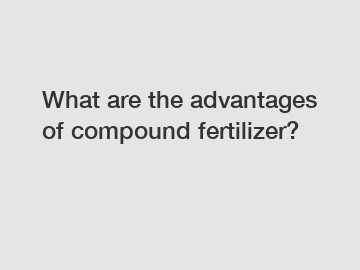Jan. 05, 2024
Agriculture
What are the advantages of compound fertilizer?
Compound fertilizers play a crucial role in modern agriculture by providing plants with a balanced combination of essential nutrients. This type of fertilizer, often referred to as blended fertilizers, is created by mixing different nutrient sources to meet the specific needs of different crops. The advantages of compound fertilizers are plentiful, ranging from improved nutrient uptake to enhanced soil fertility. Let's delve into these advantages in more detail.
Firstly, compound fertilizers offer convenience in terms of application. These fertilizers simplify the process for farmers, as they contain a precise blend of essential nutrients. By using compound fertilizers, farmers can save time and effort compared to individually applying multiple fertilizers. This also reduces the risk of over or under-fertilizing, ensuring that the plants receive the nutrients they require for optimal growth.

Secondly, compound fertilizers provide balanced nutrition to plants. Unlike single-nutrient fertilizers, compound fertilizers contain a combination of macronutrients such as nitrogen (N), phosphorus (P), and potassium (K), as well as secondary and micronutrients. Each nutrient plays a vital role in plant growth and development. Nitrogen promotes leaf and stem growth, phosphorus stimulates root development and flowering, while potassium enhances overall plant health and resistance to diseases. By providing a well-balanced mix of nutrients, compound fertilizers ensure that plants have access to all the necessary elements for healthy growth and high yield.
Thirdly, compound fertilizers enhance nutrient availability in the soil. These fertilizers are engineered to release nutrients gradually, which reduces nutrient leaching and wastage. The controlled release of nutrients corresponds with a plant's growth stage, ensuring sustained nutrition throughout the plant's life cycle. This efficient nutrient absorption not only benefits the crops but also prevents environmental pollution caused by excessive fertilizer application.
Furthermore, compound fertilizers contribute to soil fertility and improve its physical properties. Continuous use of single-nutrient fertilizers can lead to soil imbalances, depleting some essential nutrients while overloading others. On the contrary, compound fertilizers provide a balanced blend of nutrients that support the overall health of the soil. They help replenish the nutrient content, enrich microbial activity, and improve the soil structure. As a result, soil fertility is maintained, and the soil's capacity to retain water and nutrients increases, promoting healthy plant growth.
Moreover, compound fertilizers can be tailored to suit specific crops and soil conditions. Different crops have varying nutrient requirements, and compound fertilizers can be formulated to address these specific demands. Farmers can choose the composition of the fertilizer based on soil tests and crop needs, ensuring that plants receive an optimal nutrient supply. This customization allows for targeted fertilization, maximizing the benefits while reducing costs and potential environmental impacts.
In conclusion, the advantages of compound fertilizers are evident in their convenience, balanced nutrition, enhanced nutrient availability, improved soil fertility, and customization options. These fertilizers provide a one-stop solution for meeting the nutrient requirements of crops, resulting in healthier plants and higher yields. By utilizing compound fertilizers, farmers can optimize their agricultural practices, promote sustainable farming, and contribute to food security. So, it is no wonder that compound fertilizers have become an indispensable tool in modern agriculture.
For more information, please visit Granular NPK Fertilizer, sop fertilizer, Potassium Fertilizer.
Previous: What is the description of a pear fruit?
If you are interested in sending in a Guest Blogger Submission,welcome to write for us!
All Comments ( 0 )